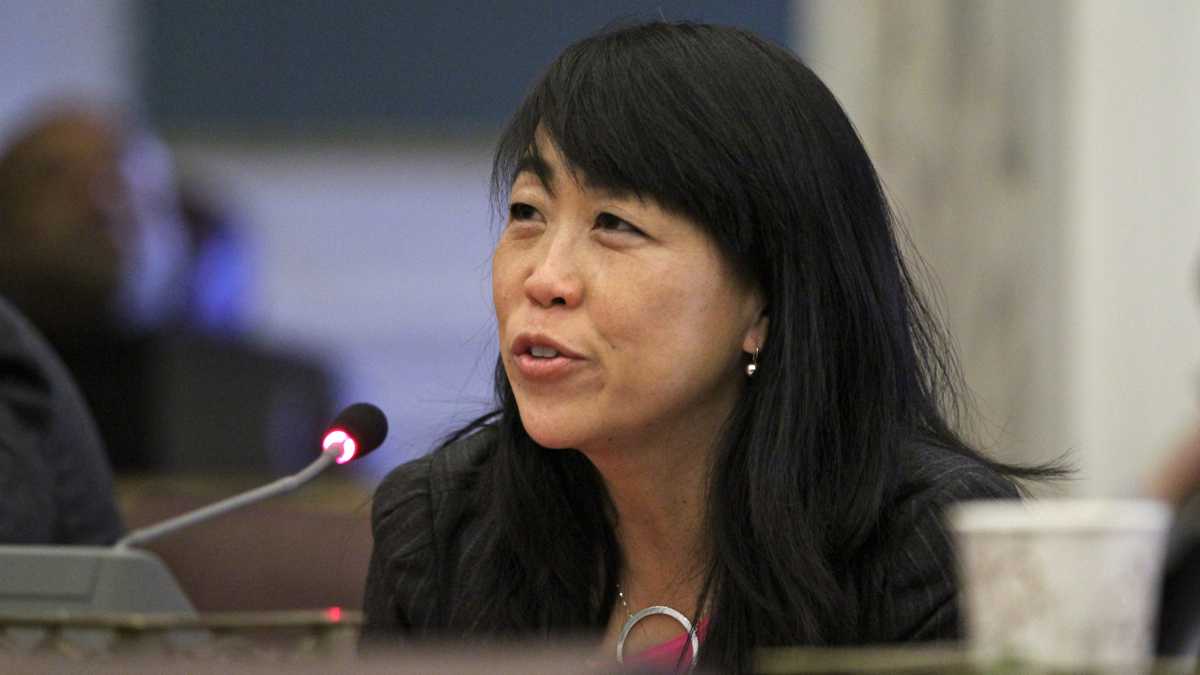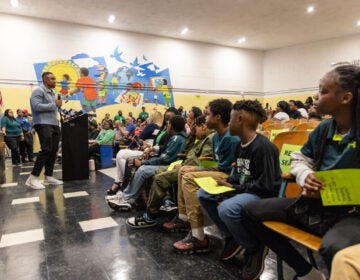City Council grills Philly school leaders on suburban students taking prized slots
Listen
During a Wednesday budget hearing, Philadelphia Councilwoman Helen Gym urged city school district officials to hire more instrumental music teachers. (NewsWorks file photo)
In its annual review of the School District of Philadelphia’s nearly $3 billion budget, City Council members zeroed in on a relatively small item.
After questioning from Councilman Bill Greenlee, district officials said 12 suburban students are paying tuition to attend special-admission schools in Philadelphia’s public system. The district could not immediately say Wednesday how much tuition the suburban students pay, how long the practice has been in place, or what schools are hosting these students.
Council members clearly were not happy about the arrangement.
“I just cannot understand how we have this policy, which admits suburban school children to the school district’s most desirable schools where we don’t have enough space for our own,” said Councilwoman Cindy Bass.
The district’s budget hearing is an annual chance for council members to grill school officials. It can be contentious, especially when the district needs more money. That wasn’t the case this year.
There was, however, plenty to discuss.
Council members, for instance, pressed the district to add more librarians. Just six district schools have full-time librarians this year, and only five are expected to have a full-time librarian next year. As recently as 2002, the district had more than 50 school librarians.
In some schools, outside organizations run libraries. Others rely on classroom-based libraries, a favored strategy of former Superintendent Arlene Ackerman.
“They’re making those decisions based on funding. That’s terrible,” said Councilwoman Jannie Blackwell.
Of course, funding looms over all conversations involving the district. After years on the brink of financial collapse, Philadelphia’s public school system has a small surplus this fiscal year, and it projects a slightly smaller surplus by the end of 2017-18.
But expense are climbing twice as fast as revenues, said Uri Monson, the district’s chief financial officer, repeating a line he’s used routinely since taking over last year. Rising charter and pension costs will drive the district into the red by 2018-19, district officials believe.
Unlike its counterpart districts across the state, Philly’s public schools don’t have taxing authority. They receive the majority of their revenue from the city and state, with the former chipping in about $1.3 billion and the later contributing roughly $1.6 billion.
City Council, however, has little say over how the district spends its money, thanks to a 2001 state takeover that set up a politically appointed board called the School Reform Commission. And so the power of the bully pulpit is about the only power city lawmakers have.
Music, contract talks and other matters
Councilwoman Helen Gym, a longtime education activist, urged district officials to hire more instrumental music teachers. Right now, the district has 66 instrumental music teachers who travel from school to school. Gym argued that schools with larger minority populations are less likely to receive music education. District officials said principals can request extra hours of instrumental music, but not all make that request.
Gym, Councilman Mark Squilla, and others also addressed the highest-profile issue facing Philadelphia’s public school system, its four-year contract stalemate with the union representing city teachers. Due to the impasse, Philly teachers haven’t gotten a rise in nearly five years.
“We’ve got a huge number of heroic educators in our city who are working in under-resourced and understaffed schools, and they’ve been pushed to the limit,” said Gym.
In recent weeks, district officials have said they’re meeting more frequently with union representatives, something Superintendent William Hite repeated Wednesday. Thanks to a recent reassessment of commercial properties by the city, the district has about $65 million in extra revenue — and that new money has helped reopen talks.
Meanwhile, the clock is ticking.
Earlier this week, the Philadelphia Federation of Teachers released results from an online survey completed by just over 1,000 teachers. More than half said they’re looking for work elsewhere, while “nearly half” said they’ve taken a second job during the school year, according to a union press release.
Wednesday’s hearing also gave the district a chance to trumpet its new investments in city schools. After years of severe cutbacks, the district has assigned a nurse and a counselor to every school this year. Officials want to add more teachers next year so that they don’t have to shuffle as many teachers around in the beginning of the school year to account for enrollment fluctuations.
Officials also vowed to add 16 counselors, seven bilingual psychologists, more instrumental music teachers, and more bilingual staff to assist immigrant families.
Many council members praised those additions, while also hurling hours of questions and recommendations at district staff Wednesday.
Councilman Allan Domb requested more financial literacy education.
Councilwoman Maria Quiñones-Sánchez requested the district do more to avoid wasting food.
Reviving an old talking point, Blackwell admonished the district for not teaching cursive.
Yet it was the fact of tuition-paying suburban students in Philadelphia schools that seemed to capture most lawmakers’ attention. Several times, council members requested a full report on the dozen students, a request the district said it would fulfill.
Correction: This article has been updated to reflected the fact that principals can request additional hours of instrumental music instruction, but that principals do not pay for music instruction out of their own budgets.
WHYY is your source for fact-based, in-depth journalism and information. As a nonprofit organization, we rely on financial support from readers like you. Please give today.





